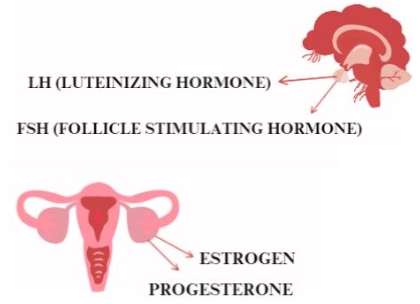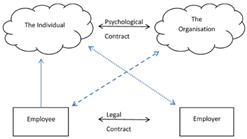Internet addiction among adults: A cross-sectional study
Abstract
Introduction: Human beings generally feel stressed at some point in life. Internet addiction disorder is increasingly gaining attention as individuals use the internet excessively as a maladaptive way to cope with daily life stress. Objective: The paper aims to find out the level of internet addiction with respect to gender, age groups, and family type, to determine the difference (if any) between males and females with respect to internet addiction, the difference (if any) in internet addiction with respect to age groups, and the difference (if any) between nuclear and joint family types with respect to internet addiction. Method: A cross-sectional study was conducted with 140 participants (71 male and 69 female) from Kolkata, West Bengal. Findings: It shows a statistically significant difference in internet addiction mean scores between males and females. It also indicates that participants under 25 years of age have higher mean scores than those over 25 years. The next part reveals that individuals in nuclear families have higher mean scores than those in joint families, regardless of gender and age group, and finally indicates a statistically significant interaction effect of age group with gender and family type. Conclusion: Gender significantly affects internet addiction mean scores, with females under 25 in nuclear families being more addicted than their counterparts.
References
Al Shawi, A. F., Hameed, A. K., Shalal, A. I., et al. (2022). Internet Addiction and Its Relationship to Gender, Depression and Anxiety Among Medical Students in Anbar Governorate-West of Iraq. Community Health Equity Research & Policy, 42(3), 253–256. https://doi.org/10.1177/0272684x20985708
Anderson, E. L., Steen, E., & Stavropoulos, V. (2017). Internet use and Problematic Internet Use: a systematic review of longitudinal research trends in adolescence and emergent adulthood. International Journal of Adolescence and Youth, 22(4), 430–454. https://doi.org/10.1080/02673843.2016.1227716
Augner, C., & Hacker, G. W. (2012). Associations between problematic mobile phone use and psychological parameters in young adults. International Journal of Public Health, 57(2), 437–441. https://doi.org/10.1007/s00038-011-0234-z
Černja, I., Vejmelka, L., & Rajter, M. (2019). Internet addiction test: Croatian preliminary study. BMC Psychiatry, 19(1). https://doi.org/10.1186/s12888-019-2366-2
Chou, H.-T. G., & Edge, N. (2012). “They Are Happier and Having Better Lives than I Am”: The Impact of Using Facebook on Perceptions of Others’ Lives. Cyberpsychology, Behavior, and Social Networking, 15(2), 117–121. https://doi.org/10.1089/cyber.2011.0324
Chou, C. (2001). Internet heavy use and addiction among Taiwanese college students: an online interview study. Cyber Psychology & Behavior, 4(5), 573-585.
Dowling, N. A., & Quirk, K. L. (2009). Screening for Internet dependence: do the proposed diagnostic criteria differentiate normal from dependent Internet use? Cyber Psychology & Behavior, 12(1), 21-27.
Frangos, C. C., & Kiohos, A. (2013). Gender differences in Internet addiction and problematic Internet use: A meta-analysis. Computers in Human Behavior, 29(5), 1902–1908.
Goel, D., Subramanyam, A., & Kamath, R. (2013). A study on the prevalence of internet addiction and its association with psychopathology in Indian adolescents. Indian Journal of Psychiatry, 55(2), 140. https://doi.org/10.4103/0019-5545.111451
Goswami, V., & Singh, D. R. (2016). Internet addiction among adolescents: A review of the research. The International Journal of Indian Psychology, 3(3), 37–44. https://doi.org/10.25215/0303.194
Haroon, Z., Zeb, Z., Javed, Z., et al. (2019). Internet addiction in medical students. Journal of Ayub Medical College Abbottabad, 30(4-Sup).
Horita, H., Seki, Y., & Shimizu, E. (2022). Parents’ Perspectives on their Relationship with Their Adolescent Children with Internet Addiction: Survey Study. JMIR Pediatrics and Parenting, 5(4), e35466. https://doi.org/10.2196/35466
Karmakar, T., & Karmakar, M. (2017). A comparative study on internet use by rural and urban college students. International Journal of Advanced Research, 5(3), 1125–1132. https://doi.org/10.21474/ijar01/3615
Kuss, D. J., & Griffiths, M. D. (2011). Online social networking and addiction—a review of the psychological literature. Journal of Environmental Research and Public Health, 8(9), 3528–3552. https://doi.org/10.3390/ijerph8093528
Mohammadkhani, P., Alkasir, E., Pourshahbaz, A., et al. (2017). Internet addiction in high school students and its relationship with the symptoms of mental disorders. Iranian Rehabilitation Journal, 15(2), 141–148. https://doi.org/10.18869/nrip.irj.15.2.141
Shaw, M., & Black, D. W. (2008). Internet Addiction. CNS Drugs, 22(5), 353–365. https://doi.org/10.2165/00023210-200822050-00001
Turel, O., Poppa, N. T., & Gil-Or, O. (2018). Neuroticism magnifies the detrimental association between social media addiction symptoms and wellbeing in women, but not in men: a three-way moderation model. Psychiatric Quarterly, 89, 605–619. https://doi.org/10.1007/s11126-018-9563-x
Copyright (c) 2024 Reshmi Dutta, Rita Karmakar

This work is licensed under a Creative Commons Attribution 4.0 International License.









